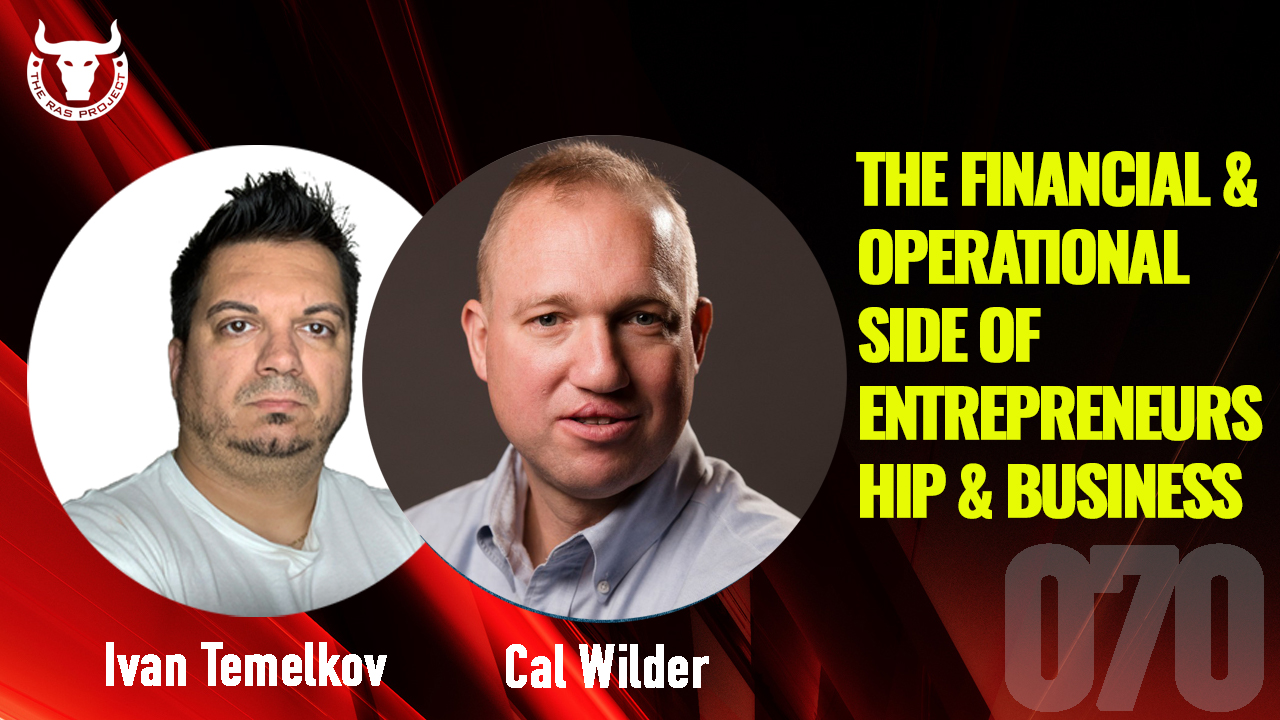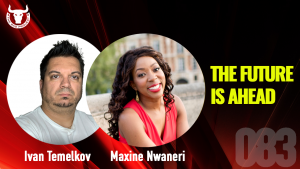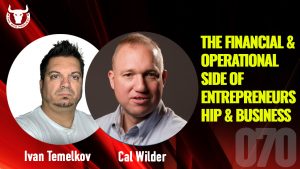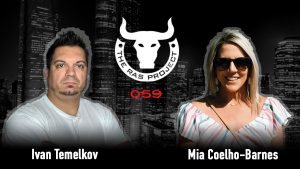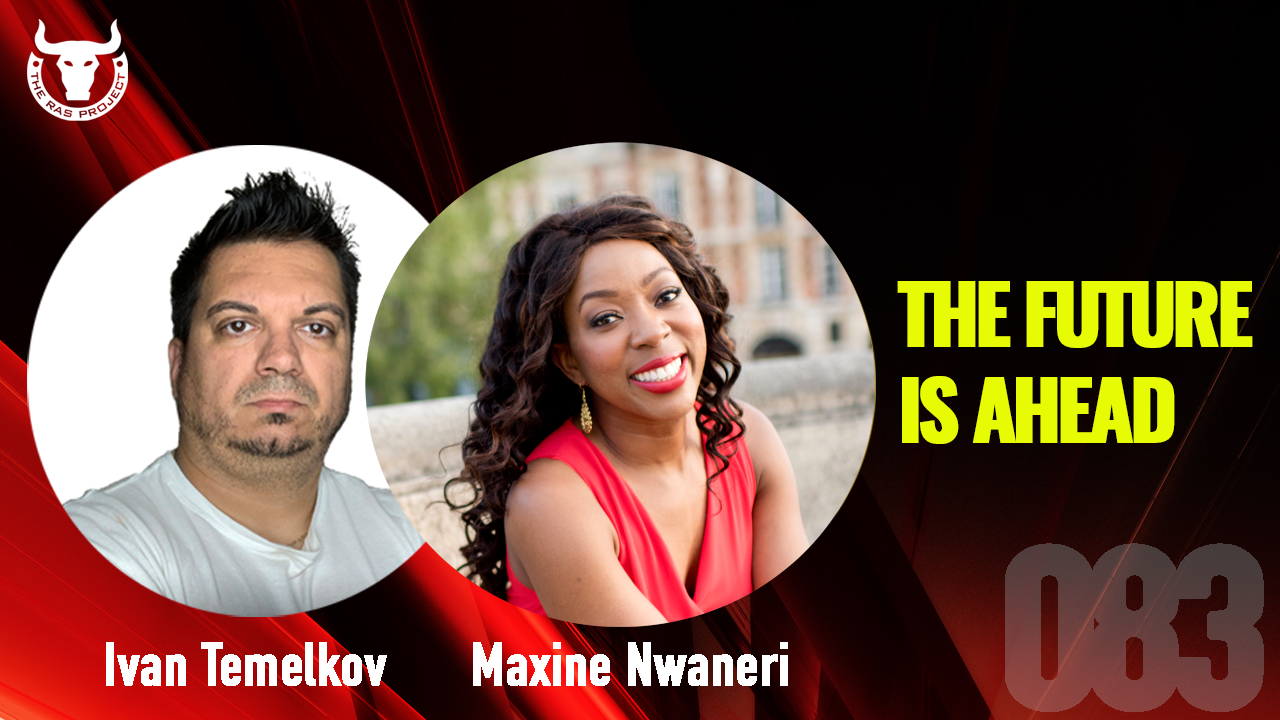
The Financial & Operational Side of Entrepreneurship & Business w/ Cal Wilder - The RAS Project 070
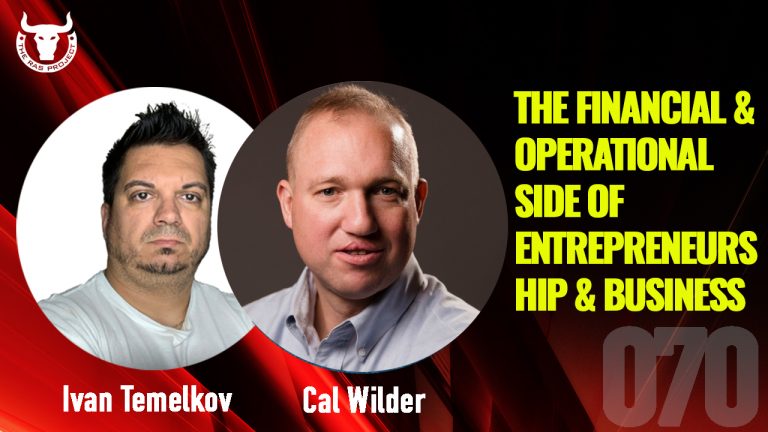
Cal Wilder’s passion is empowering small business owners to take control of their finances and improve their financial fitness. An entrepreneur himself having founded 8 companies, and having advised hundreds of small businesses, Cal knows first hand the trials and tribulations of small business owners. He recently published a book The Financial Operating System to share his process. We chat about his observations and advice for entrepreneurs based on his experience over the last 20 years.
The RAS Project is available on Apple Podcasts, Google Podcasts, Spotify, and iHeartRadio. You can also watch in video on my YouTube channel and Facebook Watch.
- Apple Podcasts – https://ivnt.io/ras-on-apple-podcasts
- Google Podcasts – https://ivnt.io/ras-on-google-play
- Spotify – https://ivnt.io/ras-on-spotify
- iHeartRadio – https://ivnt.io/ras-on-iheartradio
Ivan Temelkov [00:14]
Welcome to The RAS Project. A conversation about life, entrepreneurship, personal development, family tech and marketing. My name is Ivan Temelkov I’m your host. What’s in this podcast for you? Here you will grasp life changing advice, to help you level up in every aspect of your life in business to help you reach goals and dreams. And as always, all content is 100%. Real, raw and unfiltered. Today I’m joined by another guest on the podcast by the name of Cal Wilder, who is extremely passionate about helping small business owners take control of their finances. Cal, how’s it going?
Cal Wilder [00:56]
Great. I’m happy to be with you, Ivan.
Ivan Temelkov [00:58]
Awesome. Awesome. That has to be one of the best buyers, I think that I’ve heard in quite a while because it’s straight to the point. It’s so concise. And I love it. So let’s start out with you know, tell us a little bit about yourself what you do. And how did you get into what you’re doing today?
Cal Wilder [01:16]
Yeah, sure. So I’m kind of a lifelong learner. And I’ve kind of stumbled into entrepreneurship and spent most of my career running and working and supporting with small businesses of all kinds. And so now I will develop empathy for small business owners, because I’ve seen that too many of them are really struggling. They’re not making the kind of money they hoped to be making when they started their business. They don’t know why that is, and they don’t really know what to do about it.
And so those are the kinds of business owners were trying to help me personally when I consult with them and in my company when we do it.
Ivan Temelkov [01:52]
Awesome. So you mentioned a couple of things that I think a lot of newcomers to the entrepreneurial game, don’t understand. Is this That, you know, there really isn’t sort of a book to success in entrepreneurship. You know, there’s a lot of struggles. There’s there’s a lot of risks, a lot of sacrifices, you know, there’s a lot of failures, really, you know, in entrepreneurship. So, you know, you were talking about, you know, helping businesses and entrepreneurs. Let’s talk specifically more about how do you how do you help those entrepreneurs, you know, what are some ways that you help them, help them guide them through the entrepreneurial journey? Yeah, so.
Cal Wilder [02:30]
There’s, as you said, there’s a lot that goes into being an entrepreneur. And I’m focused more on the finance side of things, although certainly learned a lot over the years and decades when it comes to marketing and sales and growth and operations management. My career has mostly been in, in finance and operations. So that’s where I can add the most value to businesses. And I kind of laid out my approach recently, I’ve kind of developed it over the last 20 years of working with hundreds of small businesses and realized.
You know, there’s only so many that I can work with, personally, right? And I really want to help a lot more than when I personally can. And so kind of laid out what has been in my head that’s been developed over the years into a book called The financial operating system. And that’s what we use at my company smart books when we go in to consult with small businesses. And it’s also available, you know, for those who want to kind of self implement on a do it yourself basis, but we go through a proven six step six step process, where business owners first identify why they’re in business, what they’re trying to accomplish, and then ultimately go through a process and apply development, apply some financial metrics and management systems in the business.
And then they can monitor their financial performance and actually understand how the business is performing. financially. Sometimes this is the first time small businesses I’ve ever really understood how their businesses are performing month after month and kind of been in a position to be able to drive the metrics that that move them in the direction they want to move.
Ivan Temelkov [03:58]
Yeah, yeah, that’s, that’s really, really good, because let’s face it, a lot of newcomers into the entrepreneurial game are very blind going into this. Things like, you know, capital and cash flow and month over month, year over year growth. And you talked about operations, like, you know, most people think that, you know, I have a strong passion, most entrepreneurs, and that’s going to help you make money. Well, sure, well, but there’s a lot more nuances to that than just, you know, saying you’re great at marketing, or you have great a business or you’re great at sales, right?
That’s just not, that’s just not going to cut it. So he talks about the financial operating system, you know, which is a proven process, you know, what specific things, you know, or does that system teach entrepreneurs, you know, is there anything specific that you focus on? Or is it kind of like a blanket approach to, you know, a guidance into entrepreneurship and finances?
Cal Wilder [04:51]
Yeah, I mean, if we distill it down, the first thing we want to do is have the business owner define what they’re trying to accomplish with their business. What does success Look like to them. And then we define a set of performance metrics that reflect performance against those objectives. And we measure that and report back on that. And you can iterate and improve and make business decisions geared around those metrics that reflect how you’re performing against your goals. So ultimately, at its core, there’s a lot of focus on metrics and scorecards and reporting. But before we can even get to the point of defining the right metrics for the business, we’ve got to understand what you’re really trying to accomplish. Are you looking to grow the business? Are you looking to eventually be able to sell it? Are you looking to be able to transition it to your children? Is growth really important to you and you’re willing to sacrifice you know, profitability? Now, you know, what, what are you really trying to accomplish with with the business? How much risk are you willing to take? Right? Are you willing to personally guarantee a bank loan in order to invest in something or buy some assets or is that level of risk just too much for you at this point in your career, your life, right? So it’s, it’s really getting the business owner to figure Got what they really want, first of all, and then we figure out the metrics after that.
Ivan Temelkov [06:04]
Sure. That’s an excellent point, too, that you mentioned, because you said success and growth. And I think that most entrepreneurs, especially new ones come into the game is just think that it’s about making money and fame, and they think that their business is going to skyrocket overnight. Not it’s so far from the reality. Right. So let’s talk a little bit about, you know, what are some things some specific ways, you know, that you go about, you know, helping entrepreneurs in terms of Okay, let’s say, you know, first you have to define what success means. Let’s say you want to make a lot of money, right, which is what the vast majority of entrepreneurs one is, they just want more money, right is how do I get the quickest route from zero to 100? So what are some tips what are some tricks maybe or insights that you can share from your experience on Hey, I want to make a lot of money. So I go about doing that.
Cal Wilder [06:55]
Yeah, so make a lot of money. That really means you want to make a lot of profit. Right. So first, you’ve got to understand the difference between sales and profit and cash flow, because ultimately you want cash in your pocket not reported profit on the income statement. And so kind of understanding the basics of you know, what is what are the financial statements mean? What’s the difference between revenue and profit. And then, kind of once you get that basic understanding, we get into thinking about the strategy in the in the business model.
And, you know, I defined strategy as the choices that a business makes in the marketplace that are different than the competition that allows them to win market share in their target market against the competition. So when you go in the business, you’re doing the same thing that everybody else is doing, you know, watch the customer gonna buy from you. It’s kind of a coin toss, you know, who they’re going to work with, and you’re new and other people are more established. So there’s got to be a reason why the target market wants to buy from you.
So you got to define what your target market is what’s you know, different and compelling about your offering versus the competition. And then what do you need to do in order to deliver on that, you know, on that uniqueness and really manage the business around it. So, um, you know, most people who start businesses are, you know, great practitioners or something, they’re great at sales, they’re great at software development, they’ve got, they love landscaping, whatever it is that they love to do, you know, they start the business, and they want to do a lot of that.
But it’s kind of getting them to think about what’s the real business model? What’s the strategy? And then once we define that, what are the right metrics that we can use to help assess performance against that strategy?
Ivan Temelkov [08:35]
Yeah, yeah. You mentioned a couple of really interesting things that I think a lot of entrepreneurs don’t take into account. I know, certainly, I haven’t is that and I’ve seen a lot of other entrepreneurs in the game, some that have been in it for, you know, a decade now is that you talked about the fact that, you know, being practitioners, so a lot of new entrepreneurs are great practitioners that can execute on things because they have a passion, something that they’re very devoted and committed to, like you said, whether it’s, you know, marketing or whether it’s, you know, a landscaping business or maybe your plumber or whatever it might be right.
But the challenge with that is, is that there’s usually no business model define, to kind of map out what the long term, you know, a path is going to be. And I think that a lot of entrepreneurs, at least I’ve seen, this being a very common problem is that they sort of oversee that, you know, there’s a lack of investment in that because they’re led to believe that if I just execute if I, if, you know, I become the best practitioner of my craft, you know, I’m gonna be able to beat my competition and achieve profitability and so on and so forth. But one of the things that you mentioned is this time, you gotta have a plan, you know, at some point, and ideally, you got to create that plan when you start it’s kind of what I’m hearing you say, correct.
Cal Wilder [09:53]
Yeah, or somewhere along the way, whenever you get serious about actually growing the business or becoming more profitable That can be a catalyst to creating the plan. You might not need a plan. If it’s just you as a sole proprietor and you’re good at your job and people want to hire you. That’s great. But when it comes to hiring employees and really growing an enterprise, that’s when the plan becomes more important.
Ivan Temelkov [10:16]
Hmm, yeah. Yeah, absolutely. Well, I’m glad you mentioned that because, like I said, a lot of new entrepreneurs, you know, really make these mistakes. I know, I’ve made a lot of these mistakes that you just mentioned. And I think it’s kind of essential to when you when you start out, because, you know, someone like me is, you know, very eager, I’m very passionate about what I do. You know, I’ve been doing it for a long time, but doing it for yourself is always different, you know, when you kind of go from a nine to five job, you know, nearly two decades and then start your own business, like I did, you know, four years ago, is is that as you kind of go through the growth phase, like you said, at some point you really stop to think, you know, how serious do I want to get about this, you know, like Like, where, where do I want to invest?
Or, you know, do I want to just remain the sole proprietor and just keep doing my own thing, which I think there’s a lot of that right now, and what’s happening in the world. But you know, like you said, if you want to gain market share, you know, if you want to achieve profitability, you know, cashflow positive, and things like that, you know, we really need to look into investing into more of a holistic plan, you know, developing that business model if you haven’t developed one, because let’s face it, I think a lot of people talk about nowadays that with social media and digital, how easy it is to start a business and true it is, I mean, you know, all you have to really be is a little bit tech savvy and also somewhat creative.
And suddenly you can be creating awareness and interest in the marketplace. But there’s a big difference, like you said, between creating interest and awareness as a sole proprietor versus being able to gain market share, and being able to achieve profitability long term. As a business, not as a sole proprietor, but when you’re hiring employees, you’re first you’re second, third, fourth, and so on. Your business starts growing and suddenly like, wait, now I have overhead. Now I have expenses. Now I have software costs.
Now I have, you know, administrative costs or whatnot. So one thing that I wanted to ask you is, you know, what, in your opinion, what are some of the biggest mistakes that you have seen, in your own experience, you know, entrepreneurs and small businesses in the early stages make in you know, how have you gone about, you know, help help helping them guide you know, through those challenges?
Cal Wilder [12:41]
Yeah, it’s, it’s a real tough trade off and balancing act when you’re trying to grow the business beyond being a sole proprietor. And so, you know, I’ve seen so many small business owners get in the hole financially because they’ve, you know, they’ve hired an employee, they’ve taken office space, they’ve gotten into long term, you know, vendor contracts. Just spend money in advance of sales, and too far in advance of sales.
And the sales don’t materialize at the same rate that they planned. But yet they’ve committed all of these expenses as if the sales were coming in. And so they start to lose a lot of money and they start to run up credit card debt, they run up their Latin, they maxed out their line of credit, they just get in the hole financially. And it’s sad. And it’s hard, though. It’s really hard to balance, sales and expense. But that’s one of the keys when you start to scale.
Unless you’re fortunate enough to have a business model with exponential growth that’s attractive to investors in angel investors or venture capitalists, then you have, you know, you have a lot of cash in the bank, and you can spend a lot in advance of sales. But for most of us in the vast majority of small businesses, we’re bootstrapping, right? We’re probably going without pay to some extent or a below market salary for a while and, you know, we’re sinking a lot of blood, sweat and tears as well as our own money into the business.
And so, you know, balancing You know, or you spend the money and not spending it too far in advance of sales, but of the other, and you often have to spend something to set up some infrastructure to be able to scale. So just balancing the two is, is the hardest. Yeah.
Ivan Temelkov [14:14]
Yeah. And, and that’s a really good point. Because, like you said, you know, front loading a lot of that I think too many entrepreneurs get excited in the beginning, and I feel like, you know, with business, it’s, it’s a long term game, you know, you really got to pace yourself. It definitely takes time, a lot of patience, you know, to get to where you want to be a lot of time, a lot of time because all of that takes time to come to fruition.
You know, you have to play and you have to strategize, you know, from an operational standpoint, from a marketing standpoint, from a sales standpoint. And you made a very good point that I wanted to touch upon, is that, you know, a lot of entrepreneurs you know, small businesses in the beginning, you know, maxed out line of credit, as opposed to kind of like from owning them. Cash because they’re paying for too many things, as opposed to really focusing on sales, because let’s face it, without sales, you don’t have a business.
And when you have more sales, then you have access to more cash flow, whether it comes in now or later. And that really helps you, you know, from a scalability standpoint, have you seen any specific industries, you know, that that might have, you know, more opportunities or might be more successful? In your experience, you know, that you’ve worked with versus others?
Cal Wilder [15:33]
Oh, that’s a tough question, because so much of it comes down to the specific business and the specific market and the skills of the founder or the founder. So the barriers to entry are certainly much lower and a lot of service businesses. You don’t need a lot of capital to start most service businesses. So you see a lot of startups in the services space right. It takes a lot more capital to start a you know, a construction or real estate business, typically And so part of it comes down to what are the financial resources of the founders? And where do their skills and experience lie where they’re most likely to be successful?
Ivan Temelkov [16:13]
Right? That’s a really good point. And the reason I asked is because, you know, I am in a service based industry. And I remember three, four years ago, when I was starting my businesses that I was looking for, you know, some startup capital, I was looking at some investor seeing anybody that will be interested in investing into a digital marketing business, and you’re probably person number, I don’t know, 100,568 that kind of validated the fact that, you know, you don’t need really, you know, any capital, like you said, the barrier of entry is so low.
And that’s why I asked the question, because I think a lot of different industries and verticals really vary in terms of barrier of entry in terms of how much upfront cash flow that you need. I think that’s the beauty about these form. You know, like the marketing space is is that you know, There’s a zero to very little upfront investment, you know, as long as you have that technical agility and creativity, you know, and, of course, seasonality and experience that can really contribute to, I can really get this going with little or nothing.
But at some point nonetheless, because I’ve thought about this, you know, now also having a full time employee is that, alright, I’m scaling, I’m wanting to grow the business. Now, hence why I asked the question a little bit ago is this, at what point does it make sense to really start thinking about, like, the long term investment and the planning, and the business model because, you know, if I want to grow, then I know, at some point, I need to look into doing something like that.
Because, you know, I look at family for instance, or, you know, other people I’ve worked with in the past, in my agency days specifically, and you know, I’ve seen those guys, you know, make those mistakes, like they didn’t plan even 10 years and and, you know, they’re making millions dollars per year. And you know, they have maybe 10, 20, 30 employees 40, 50 or more, you know, and they still really haven’t kind of invested into this holistic approach, you know, to define the business model, simply because I don’t know if it’s a lack of seeing the value in it or what, but the one thing I’ve noticed is, is that it has become very costly for them to operate as a business.
Because they don’t really have like the pillars defined. They’re really never invested into it. And I think that’s the one thing that a lot of small businesses specifically fail to understand is the study. If you don’t establish those pillars, I can talk about, you know, the operational side and the financial side, you know, to help you scale, then it’s going to take a long period of time before you actually you know, bring a business to cashflow positive. And that’s why I think, you know, I’m thinking of a specific former boss of mine, you know, that does about 15 million per year with his agent And they’re global.
Right? And they’re doing fairly well. But it took 10 years to get, you know, to this point. And I think it’s because they never really invested into what you were talking about is like a financial operating system and mapping out the path and understand that you know what, you have to invest in this for the long term success of your business? Because if you don’t, then it’s actually going to be more costly for you in the long term.
Cal Wilder [19:27]
You know, I mean, the other thing that I see, and I’ve made this mistake myself many times is trying to do too many things for too many different kinds of clients and not having that focus. So yes, we can spread ourselves really thin trying to do all different kinds of services for all different kinds of clients and all different kinds of industries. You might be really smart, and you can figure out how to do that. But when you hire a team when you try to standardize the operations, the whole company is not as agile and flexible and probably smart as you as the founder and CIO. Need to standardize is key to being able to scale so it becomes repeatable and scalable. And every project is not its own snowflake. And so that’s definitely ties straight back into the financial metrics, because if to the extent the operations are, you know, not standardized, then it becomes a lot more expensive to manage and deliver and quality control and all of that.
Ivan Temelkov [20:23]
Sure. You know, you mentioned one thing that surely I wanted to touch upon, is that being selective about your client base, and that’s ultimately what I personally am going through right now is this because I know in the four years, you know, there’s been a lot that I have learned a lot, and I guess I’ve, in a way been fortunate enough that, you know, my father is also a fellow entrepreneur who runs a business, and he’s kind of, you know, learned through the school of hard knocks, so to speak, you know, and, as you were pointing out, pointing out specifically being selective about your clients, because nowadays, I really hyper focus on that I look for certain qualities and traits.
It’s usually clients that, you know, I can build likability with clients that, you know, see value in what I have to offer that’s specifically applicable to their own unique problems, not just any problem, because I think every business has unique set of problems. And also being able to build that trust. These are ultimately the three things, you know that that I’ve kind of mapped out is likability trust value. The fourth one, of course, is persuasion, because you still have to persuade people, you know, to do business with you. But I think that, you know, if likeability and trust and value are established, and that has been proven over the last two years, based on the types of clients that I attracted, and that really got me thinking back to what you were saying is that, you know, not everyone’s going to be your client.
You don’t want everybody to be your client. But I think that in the early days as an entrepreneur as a small business, you know, you’re thinking cash flow, you’re thinking, where’s money gonna come from? So you’re kind of like a little bit desperate about taking. Exactly, you know you’re not. And let’s face it, it’s slim pickings in the beginning. Because, you know, like you said in the servant, especially in the service based industry, you know, most most companies don’t see capital, from capital for operational purposes, right?
Some do, but it’s a very, very small percentage. And so you kind of like going out there and like, Okay, I’m gonna build a huge client base, and that’s going to bring me cash flow. That’s actually I’ve learned that to be a very ineffective way of doing it, because when you attract everybody, then you’re spreading yourself too thin, because not everybody is going to see value in what you have to offer. And so long term, that’s exactly what I’m focusing on is that, you know, I would rather have you know, less than a handful of clients that are very dedicated, very focused, to understand the importance of long term investment that have more than two hands for a client and have a lot of hand holding and feel like I have to sell them every single day.
So they can see the value in what I have to offer. And I’ve been before, I’ve been there before, like, whether it’s someone that said, Hey, can you help me with with social media or building a website or paid advertising? It’s like, yeah, great, I’ll help you, then you get into the actual, you know, work. And then you find out months into it, you’re like, Well, shit, like, this really isn’t a good fit, you know? Like, it’s like a million questions. And so it really kind of borderlines with the profitability. Because if you’re spending too much time on communication, project management and not enough time on execution, it’s taken away from you being able to chip away at, you know, that promise that you’ve made that scope of work that you’ve made to a client.
And that hasn’t been a hard, hard lesson that I have learned. And so it was very interesting. You mentioned that, you know, it’s not everyone you know, will be your client, nor do you want everybody to be your client. Okay, well, you know, I really enjoyed the conversation. You know, mentioned so many different things here, you know, the entrepreneurs that are early in the game, you know, the need to consider, you know, the long term benefit. You also talked about the importance of having a team, you know, someone like you and your team that can come in that has seasonality and experience in a proven system, such as the financial operating system, you know, to help guide them for long term success. before we sign off, you know, let’s throw out some links, social handles, what’s the best way for listeners to connect with you out there?
Cal Wilder [24:37]
Yeah, so probably the number one way is to visit like company’s website, www.smartbooks.com, and there’s a link there for a free consultation. Certainly, you can put my name in there if you want to talk to me personally, and we’ll figure out what you need and how smart books may be able to help guide you through getting control over your business finances, or even if we’re not a fit, it’s our books. We can point you in the right direction.
Ivan Temelkov [24:59]
Awesome. Are thank you so much for jumping on the podcast and sharing all the great insight. You know that is 100% applicable to any small business really.
Cal Wilder [25:10]
Great. Well, thank you Ivan been great speaking with you staying around.
GET ALL MY CONTENT & SUBSCRIBE BELOW
Past Episodes







